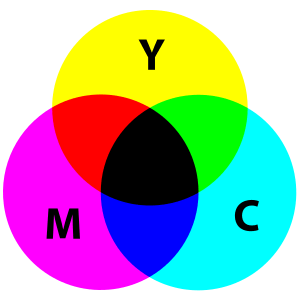CMYK color model facts for kids
The CMYK color model is a way of mixing colors, mostly used in printing. It's called a subtractive color model. This means it works by taking away light from a white surface, like paper. CMYK stands for the four ink colors used: cyan, magenta, yellow, and key (which means black).
When you print, the paper is usually white. The inks add color by absorbing some of the light that hits the paper. For example, if you put cyan ink on white paper, it absorbs red light. This makes the paper look cyan. Magenta ink absorbs green light, and yellow ink absorbs blue light. When all three colors (cyan, magenta, and yellow) are mixed together at full strength, they should theoretically create black. However, in real printing, this mix often looks like a dark, muddy gray.
Why Printers Use Black Ink
Even though mixing cyan, magenta, and yellow should make black, printers use a separate black ink. This is because the black made from mixing CMY inks isn't a true, deep black. It often looks like a very dark gray. Using a separate black ink helps in many ways:
- Clearer Text: Most text is printed in black. It's hard to make sharp, clear letters using a mix of three inks. Black ink makes text look much crisper.
- Faster Drying: If you use 100% of cyan, magenta, and yellow inks to make black, you put a lot of ink on the paper. This makes the paper very wet and takes a long time to dry. Using black ink means less total ink is used for dark areas.
- True Black Color: As mentioned, mixing CMY inks doesn't usually make a perfect black. It often looks dull or muddy. A dedicated black ink creates a much deeper and richer black color.
- Saving Money: Black ink is often cheaper than using large amounts of the other three colored inks. This helps save costs in printing.
Related pages
Images for kids
-
A color photograph of the Teton Range.
See also
 In Spanish: Modelo de color CMYK para niños
In Spanish: Modelo de color CMYK para niños
 | Calvin Brent |
 | Walter T. Bailey |
 | Martha Cassell Thompson |
 | Alberta Jeannette Cassell |






